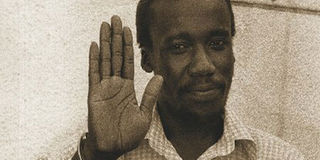Why the debate on death penalty could be with us for eternity

A photo of the late Hezekiah Ochuka. Ochuka and Pancras Okumu were executed in 1987, closing the chapter of death by hanging. PHOTO | MOHAMED AMIN
What you need to know:
- Since 1987 when Senior Private Hezekiah Ochuka and his side-kick Pancras Okumu were hanged for trying to overturn former President Moi’s government, nobody else has legally been executed in Kenya.
- Human beings have a streak of vengeance in their collective psyche that is rarely acknowledged. And often there are good reasons to seek revenge.
- I am just as confused as our justice system that will not commit itself whether to hang or not to hang. But the debate must continue.
To think of life and death in the dead of night can be a rather macabre experience.
Yet this subject has been harassing me ever since I heard some news in passing that some MPs want the death penalty to be administered once more in this country, instead of our revered judges wasting their time pronouncing sentences that have never been carried out for the past 29 years.
Since 1987 when Senior Private Hezekiah Ochuka and his side-kick Pancras Okumu were hanged for trying to overturn former President Moi’s government, nobody else has legally been executed in Kenya, although thousands have been sentenced to death for murder and assorted crimes such as violent robbery.
It seems that no subsequent President has had the heart to endorse an execution, though the penalty remains in the books.
As a result, the whole affair remains an anomaly to many. Why keep a sentence in the law books and then refuse to carry it out?
Why not just do away with capital punishment altogether, or make up our minds to hang murderers, traitors, spies or violent robbers by the neck until they are dead?
The debate on whether it is prudent or not to abolish capital punishment has been on and off for years on end, but it has always been inconclusive, and this because it is a debate between pragmatists and idealists, between those who believe in retribution (life for life), and those who believe that the taking of all life is unacceptable whether sanctioned by the State or not.
It is difficult to tell where Kenyans stand on this issue, for they are always more preoccupied with politics than such esoteric subjects.
But if they were honest, they would admit they could not care less what happened to “the scum of the earth”.
After all, they reason, the majority of their kinsmen are not murderers, so why bother with all that nonsense? If someone kills, he deserves to die, period.
NO EVIDENCE
To think like this is tempting. Human beings have a streak of vengeance in their collective psyche that is rarely acknowledged. And often there are good reasons to seek revenge.
If, for instance, you have been a victim of violent crime which left a loved one maimed or dead, you are not likely to agree with those who oppose capital punishment.
If asked, you would wish all the assailants dead and buried. It’s only human.
The death penalty has a history. Hammurabi ‘the law-giver’, a native of Babylon (in modern Iraq), included it in his famous code formulated 1750 years before Christ.
Even the Holy Bible sanctions it somewhere. Closer home, different societies had different ways of dealing with murderers, witches and rapists.
The Kikuyu, I understand, used to stuff them in beehives and roll them down steep hills after an exhaustive legal process.
It is difficult to make a convincing case for doing away with the death penalty, but some people have tried.
First, they argue that there is no empirical evidence that hanging murderers, for instance, has any deterrent value.
Secondly, and a lot more convincingly, they argue that the chances of executing an innocent person are ever-present, for no judicial system is perfect.
If this happens, there is no chance of rectification should the truth be established later.
DITHERING ADMINISTRAION
Third, the death penalty affects the poor more than any other economic class.
If you are wealthy, you can hire the best lawyers to keep your neck safe, but if you have to rely on pro bono lawyers or those paid by the State, chances are they won’t strive too hard to save you. Thus poverty becomes a death sentence on its own.
Fourth, our system relies on the judgment of one person who has been given the power of life and death over his fellows by the law.
And as we have seen, even judges can get it wrong or become susceptible to outside influences.
In other systems, a jury has the final say on the death verdict, which may dilute the mischief of an errant or biased judge.
I have carefully tried to steer away from taking sides on this issue, for I am neither a bleeding-heart liberal nor some kind of ogre thirsting for blood.
I am just as confused as our justice system that will not commit itself whether to hang or not to hang. But the debate must continue.




